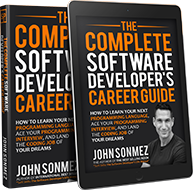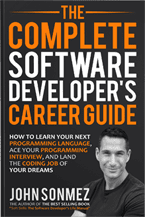With around 230 positive reviews (85% of five stars) (4.7 on the average), John Sonmez made a huge success when he published his first book “Soft Skills”. 2.5 years later we get another book. Can the new book continue his success?
Can it move you further with the career?
Bonuses today: giveaway and little Q&A with John.
Let’s see!
The book
The Complete Software Developer’s Career Guide
The release date is 19th July, and as I know for a few days there will be a huge discount. Click on the link above for more details.
I probably don’t have to introduce John, as he’s quite a unique person in Software and Personal Development. If you like to know him more, just visit SimpleProgrammer.com
Also, the book was written in parts, and most of that was already published on John’s blog. So you can check it out as well.
The structure
The book consists of five main sections and 60 chapters!
Getting Started as a Software Developer
How to Get Started. The Technical Skills You Need to Have. What Programming Language Should I Learn, College. Coding Boot Camps. Teaching Yourself.
Getting a Job
Internships. Getting a Job Without Experience. How to Find a Job. The Interview Process. Salaries and Negotiation. How to Leave a Job. Switching Mid-Career. Contracting. How the Recruiting Industry Works.
What You Need to Know About Software Development
Overview of Programming Languages. Web Development. Mobile Development. Backend Development. Video Game Development. DBAs and DevOps. Software Development Methodologies. Testing and QA. TDD. Source Control. Continuous Integration. Debugging. Maintaining Code. Types of Work.
Working as a Developer
Dealing with Coworkers and Your Boss. Working With QA. Life / Work Balance. Teams. Selling Your Ideas. How to Dress. The Review Process. Dealing with Prejudice. Being in a Leadership Position. Getting a Raise or Promotion. Women in Tech.
Advancing Your Career
Creating a Reputation. Networking. Keeping Your Skills Up to Date. Generalist vs Specialist. Speaking and Conferences. Creating a Blog. Freelancing and Starting a Business. Career Paths. Job Stability and Security. Training and Certifications. Side Projects.
Best Books to Read. Parting Words
My view
The first thing I liked and struck me was the introduction. I wanted to know if this book is also for an experienced developer. So here are some good parts:
I know. I know you know all this stuff.
You don’t need a basic book from some “hot-shot” on how to get started as a software developer. You don’t need to learn what source control is or get insight on whether you should go to college or boot camp.
I get it—really, I do.But, trust me on this one, this book is still for you. Here’s why: …
I like the style of writing! After reading a few paragraphs, I can see that John is honest and write about real things, not theoretical stuff. So it’s not just the first few pages that are fun to read. There are much more across the whole book.
I can skip the whole part about the introduction to Software Development, Collage, etc… writing my first resume (since I am already that expert… right? :)). Still, there are areas worth refreshing some of the stuff.
Clearly, I won’t be able to learn a programming language from that book or source control, design pattern… but in those chapters, I could get some basic overview. For example, I am in backed dev mostly… so I liked parts about Web Development.
I focused more on the last two sections: Working as a Developer and Advancing Your Career.
What we have here? Almost everything to move you further in your career and be the best developer in a team.
For example, I totally agree that if you cooperate with your boss, and be:
be the person your boss can count on to resolve problems and move the project forward, and you’ll be regarded as an extremely valuable asset.
Plus, there is also advice how to deal with not perfect bosses, like “Ignoramus”, “Slave Driver,” or micromanagement.
I like that the book strengthens the need to collaborate across all the teams. It’s not just your code, your project. Talk to QA, create better tests, try to get what are the real requirements. Then, by understanding both the bigger picture and the little details, you be able to move further and create better software.
I agree, with the need to build a personal brand. It’s not that you need to create a blog with thousands of readers - that’s one way of course, but you can simply create a strong reputation in your company by being an influential expert in your field or being a great leader. In general, try to create value for others. If you get an exposure/visibility, it will be easier to get a better job or promotion. Not to mention the satisfaction for yourself.
Some bullet point for me to take action:
- Make my boss happy by using at least daily/weekly reports from my tasks
- Cooperate with other teams
- Focus on automation
- Take responsibility
- Consistency beats all the other factors regarding blogging
- Look for other areas, move away from your comfort zone
Summary
Final mark: 4.5/5
Pros:
- Easy to read as each chapter is a separate part.
- I like that there are some letters with real dev stories included
- Practical approach, not much dry theories
- A lot of content, useful for beginners/intermediate/experts
- Just pick a topic that is most related to your current career situation.
- Motivates to do something, be better and move forward.
- Lots of evergreen content, not only valid for one year… should be valid even in 5 or more years.
Cons:
- I couldn’t find chapters about remote jobs, would be nice addition
- Some chapters might feel too general
The book feels like an extension of Soft Skills, but more focused on the programming/career. And it’s also stand-alone, so you don’t have to read Soft Skills first.
It should be a good start for people entering the industry, but also devs who are already inside - to refresh the knowledge, understand other areas of IT, think about other possibilities.
Of course, John sometimes touches the tip of an iceberg, so it’s only a high-level overview (especially in areas like CI, source control, methodologies, etc.) Still, a lot of content is unique - especially for career topics. There are not many books about that.
Have you read the book? What’s your opinion about it?
What’s your favorite book on the similar topic?
Bonus - little Q&A with John
A Few questions to John, with his answers!
Bartek: I’m a C++ programmer, so I need to ask you this :) In the book, you mentioned C++ several times. What do you think about Modern C++? With recent additions to the language in C++11, C++14, and upcoming C++17 it really feels like a new language. Do you still think there’s no future for it? Or the code bases will eventually move to Rust/Java/C#? (or even Java Script :))
John: I like the changes to the language and I think they are very much needed, but I still think the future is somewhat bleak.
What I mean by this is that even though I love C++, the new features and the legacy of it have really added to the complexity and confusion around it.For example, take some classic book like Effective C++. It’s basically irrelevant at this point.
That’s really confusing. I wish they would have called the new C++ something completely different to break ties with the past.
I also feel like all this has been bolted on.
Of course you could say the same now about C# and Java, which are also beginning to suffer from the same kinds of problems.
In my opinion, C++. C# and Java have all become far too complex as the features have expanded and expanded.With that said, of course, there is a future for existing C++ developers. There will be C++ for the next 50+ years, I’m sure of it. I just wouldn’t recommend new developers to get into it at this point–unless they really love the language.
Bartek: We have so many online courses, blogs, video… is learning from books still important?
My note: I believe books still have a future as they give a description of a problem from start to finish. If you learn from online/blogs, then the information seems to be more shattered/more chaotic.
John: I agree with you. Books often provide a more thought-out, organized and comprehensive and cohesive view of a topic or subject. Consider how long it takes and how much effort it takes to write a book versus produce a video or blog post.
At the same time though, I do believe video courses are very effective learning tools for software development.
Bartek: Just in five points: what are the 5 key skills of a good software developer?
John:
- Able to communicate and organize his ideas clearly.
- Ability to self-educate and learn whatever needs to be learned to do the job.
- Abstraction. The ability to take and simplify a problem and discover abstractions that further simplify it.
- Inspiring and mentoring others. A developer who makes the whole team better is the most valuable asset on a team.
- Ability to write clear and readable code. The best developers write code that reads like a book. Because they know that code is read more than written.
What would be your answers to those questions? Do you agree with John?
The giveaway
I’m happy you read through the whole post, so now I have a little prize for you.
I have three copies of John’s new book. Just take part in the giveaway. Enter your details below, add a comment, share my post on Twitter. The whole event lasts for two weeks - until 30th July midnight (Poland Time). I’ll announce winners on Monday 31st July in the morning.
The Complete Software Developer’s Career Guide
